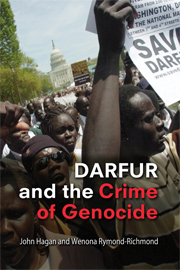Crossref Citations
This Book has been
cited by the following publications. This list is generated based on data provided by Crossref.
Hagan, John
Rymond-Richmond, Wenona
and
Palloni, Alberto
2009.
Racial Targeting of Sexual Violence in Darfur.
American Journal of Public Health,
Vol. 99,
Issue. 8,
p.
1386.
2009.
Publications Received.
Contemporary Sociology: A Journal of Reviews,
Vol. 38,
Issue. 2,
p.
211.
Hagan, John
2009.
Prosecuting Ethnic Cleansing and Mass Atrocity in the Former Yugoslavia and Darfur.
Journal of Scandinavian Studies in Criminology and Crime Prevention,
Vol. 10,
Issue. sup1,
p.
26.
Nelken, David
2010.
Human Trafficking and Legal Culture.
Israel Law Review,
Vol. 43,
Issue. 3,
p.
479.
RAFTER, NICOLE
2010.
SILENCE AND MEMORY IN CRIMINOLOGY—THE AMERICAN SOCIETY OF CRIMINOLOGY 2009 SUTHERLAND ADDRESS*.
Criminology,
Vol. 48,
Issue. 2,
p.
339.
Savelsberg, Joachim J.
and
Flood, Sarah
2011.
American Criminology Meets Collins: Global Theory of Intellectual Change and a Policy‐Oriented Field1.
Sociological Forum,
Vol. 26,
Issue. 1,
p.
21.
Moon, Claire
2011.
The crime of crimes and the crime of criminology: genocide, criminology and Darfur.
The British Journal of Sociology,
Vol. 62,
Issue. 1,
p.
49.
Karstedt, Susanne
2011.
The Blackwell Encyclopedia of Sociology.
Criger, David W.
2011.
Critical Perspectives on Crime and Social Harm: Toward a Criminology of Human Rights.
Sociology Compass,
Vol. 5,
Issue. 11,
p.
984.
Hagan, John
and
Kaiser, Joshua
2011.
The displaced and dispossessed of Darfur: explaining the sources of a continuing state‐led genocide.
The British Journal of Sociology,
Vol. 62,
Issue. 1,
p.
1.
Hagan, John
and
Kaiser, Joshua
2011.
Forms of genocidal destruction: a response to commentators.
The British Journal of Sociology,
Vol. 62,
Issue. 1,
p.
62.
Mann, Michael
2011.
Processes of murderous cleansing/genocide: comment on Hagan and Kaiser.
The British Journal of Sociology,
Vol. 62,
Issue. 1,
p.
42.
Aranda-Corral, Gonzalo A.
Borrego-Diaz, Joaquin
and
Galan-Paez, Juan
2012.
Scale-free structure in concept lattices associated to complex systems.
p.
1.
Madibbo, Amal Ibrahim
2012.
Conflict and the conceptions of identities in the Sudan.
Current Sociology,
Vol. 60,
Issue. 3,
p.
302.
Karstedt, Susanne
2012.
The Wiley‐Blackwell Encyclopedia of Globalization.
Baxi, Upendra
2012.
The Cambridge Companion to Human Rights Law.
p.
150.
Karstedt, Susanne
2013.
Contextualizing Mass Atrocity Crimes: Moving Toward a Relational Approach.
Annual Review of Law and Social Science,
Vol. 9,
Issue. 1,
p.
383.
Garriott, William
2013.
Policing and Contemporary Governance.
p.
1.
Aranda‐Corral, Gonzalo A.
Borrego‐Díaz, Joaquín
and
Galán‐Páez, Juan
2013.
On the Phenomenological Reconstruction of Complex Systems—The Scale‐Free Conceptualization Hypothesis.
Systems Research and Behavioral Science,
Vol. 30,
Issue. 6,
p.
716.
Krieg, Andreas
2013.
Motivations for Humanitarian intervention.
p.
61.



